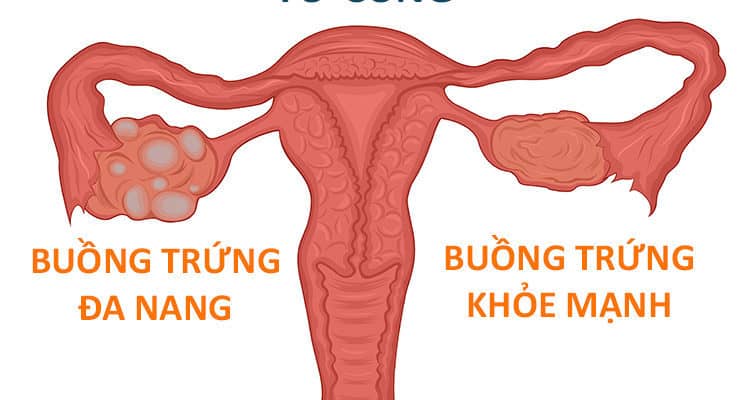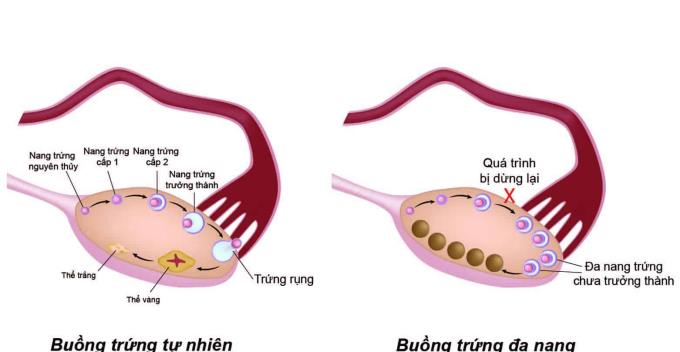
Polycystic ovaries are a hormone-related disease that commonly occurs in women of childbearing age. This syndrome can happen in any woman, adversely affect fertility, causing many other serious health problems.
Polycystic ovary syndrome occurs when the ovaries have many small follicles. This is considered to be an endocrine disorder associated with hormone imbalance and insullin resistance affecting the health and fertility of women. To be able to answer questions about whether polycystic ovaries are pregnant, what signs are polycystic ovaries, how to cure polycystic ovaries, please refer to the following articles of aFamilyToday Health.
What is polycystic ovary syndrome?
Polycystic ovary (also known as PCOS - Polycystic Ovary Syndrome) is a problem that occurs in women who have too much male sex hormones while the amount of female sex hormones in the body is not enough. This causes ovulation to become more irregular. If not treated early, it can lead to a hormone imbalance, seriously affect your health and increase your risk of several diseases including: diabetes, heart disease and fertility disorders.
When you have polycystic ovary syndrome, the amount of male sex hormones in a woman's body will be too much to prevent ovulation, causing the egg to fill in the follicle. Many women with this disease have dilated ovaries that contain clusters of small follicles. If the follicles do not develop normally and ovulation occurs incorrectly, it will lead to an imbalance of male and female hormones in the body.
Most women with polycystic ovary disease, the body reacts with insulin resistance to prevent sugar (glucose) from metabolizing. Treatment is done by adding insulin to deliver sugar (glucose) into cells, storing and supplying energy to the body. If the body contains too much insulin, women will easily crave food, leading to weight gain and the production of more male hormones.
This syndrome affects 2.2 - 26.7% of women of reproductive age. Therefore, this disease has become one of the most common causes of infertility among women . In one study up to 70% of women with PCOS went undiagnosed.
8 signs to identify ovarian polycysts

Because the different hormone changes that lead to signs of polycystic ovary syndrome (PCOS) are also different from person to person. Up to 80% of women with this syndrome are obese, usually abdominal obesity, and more than 70% of women have hair growth on the face, chest, lower abdomen, back or thighs. Here are 8 common signs of polycystic ovarian syndrome:
Abnormal, irregular , or prolonged menstrual cycles are the most common sign of polycystic ovaries. For example, in a year, you will have 9 fewer "red light" occurrences. Each cycle lasts more than 35 days and bleeding is unusual. Menstrual periods are very few or very heavy or have unexpected periods.
Having difficulty conceiving .
Skin problems such as: acne, dark patches or excess skin in the armpits or around the neck.
Sleep apnea.
Growth of hair on the face, upper chest, abdomen, back, or thighs.
Depression or mood swings.
Weight gain, obesity.
Thinning hair or heavy hair loss.
3 main causes of polycystic ovaries
According to the scientists, the following factors could be the cause of polycystic ovary syndrome:
1. Genetics
This is the single highest risk factor for developing polycystic ovary syndrome. If your mother, sister, or sister has polycystic ovaries, you are at high risk for it or have diabetes or irregular menstrual periods . Researchers also question the possibility that certain genes are associated with this syndrome.
2. Insulin resistance or metabolic syndrome
Did you know insulin is an important hormone that helps control glucose (sugar) in the body, metabolize blood sugar into cells. If your body is insulin resistant, your body's tissues are resistant to the effects of insulin, accidentally disrupting your ability to use insulin. As a result, the pancreas secretes more insulin to supply the cells with sugar. This excess insulin can adversely affect the ovaries by increasing androgen production. Increased androgen production can interfere with follicle growth, reduce the ovarian 's ability to ovulate , cause acne and hair loss.
In addition, when not metabolized into cells, sugar is converted into fat, making it difficult for people with PCOS to gain weight, become obese or lose weight.
3. Diet - The suspect causes ovarian polycysts

Many theories suspect that a diet high in carbohydrates may also be the cause of polycystic ovary syndrome. In fact, most people with PCOS are overweight, but thin people are also at risk. Unbalanced body, round 2 develops obesity (abdominal obesity) is characteristic of the metabolic syndrome caused by insulin resistance.
What is an increased risk for people with polycystic ovaries?
Many people wonder if polycystic ovary disease is dangerous, can polycystic ovaries be pregnant? In fact, when you have this syndrome, in addition to the risk of infertility, you have a higher risk of developing dangerous diseases like:
Diabetes: More than half of all women with PCOS develop diabetes or prediabetes before the age of 40. It is caused by a disorder in the regulation of the hormone estrogen and insulin levels in the body.
High blood pressure: Women with this syndrome have an increased risk of developing high blood pressure.
High blood cholesterol: People with polycystic ovaries often have bad cholesterol (LDL) than good cholesterol (HDL). This leads to an increased risk of cardiovascular disease and stroke.
Sleep Apnea: This is a temporary disorder that occurs when a person stops breathing several times during sleep. Usually women with polycystic ovaries are obese or overweight. This increases your risk of sleep apnea.
Endometrial cancer: With ovarian polycysts, you often have problems with ovulation, obesity, insulin resistance and diabetes. All of these can increase your risk of developing endometrial (endometrial) cancer.
Depression and anxiety: This condition is commonly seen in women with polycystic ovaries.
Methods of diagnosis

Polycystic Ovary Syndrome can be difficult to diagnose because symptoms vary from person to person. If you have PCOS, symptoms may appear and go away shortly. First, the doctor needs to rule out possible causes of this symptom, such as a thyroid problem . Your doctor will diagnose you with PCOS based on the following factors:
Health history and menstrual cycle
A blood test to measure hormone levels
Transvaginal ultrasound to check for a polycystic and enlarged ovary.
4 ways to treat polycystic ovaries to help support fertility
Whether polycystic ovaries can cure or how to treat polycystic ovaries… is the question of most patients when diagnosed with this condition. According to health experts, PCOS cannot be completely cured, but you can deal with the symptoms. Depending on the needs of the patient, the doctor will give an appropriate treatment regimen, such as: Treatment aimed at regulating the menstrual cycle or treating pregnancy.
1. Lose weight

If you have belly fat, weight loss helps a lot for ovulation, increasing fertility. When you lose about 5 - 7 kg, the menstrual cycle will take place more steadily, reduce cholesterol, adjust insulin in the body.
Lose weight by incorporating a diet high in fiber, low in carbohydrates and with proper exercise.
2. Using fertility drugs is a treatment for polycystic ovaries
If you are trying to have a baby, your doctor will review and decide which medication is right for you. Such as:
♦ Clomiphene: If you have lost weight and your period is still irregular, your doctor will prescribe you to use clomiphene - a drug that helps increase fertility. About 80% of women treated with clomiphene begin ovulating within the first 3 months. Among them, up to 30-40% of pregnant women in the third treatment.
♦ Letrozole: Your doctor may recommend that you use letrozole to stimulate ovulation. This drug is more effective than clomiphene in regulating ovulation and supporting pregnancy in people with PCOS.
♦ Metformin: This is one of the drugs that stimulates ovulation. This drug is more effective if combined with clomiphene or letrozole in the treatment of PCOS.
♦ Gonadotropins: If treatment with other drugs does not work, your doctor will recommend gonadotropin . This is an injectable drug that stimulates ovulation as well as helps eggs develop. Up to about 60% of women with PCOS become pregnant while receiving this drug.
3. Ovarian Surgery Methods
If the treatment with the above drugs does not work, your doctor can now advise you on a surgical method called ovarian drilling to create small holes in the ovaries. This helps to reduce the levels of male hormones and enhances ovulation.
Unlike oral or injectable medications, ovarian drills are a one-time treatment. The effects of this method are temporary, but about 50% of women become pregnant within a year of surgery.
4. In vitro fertilization
If no other treatment is right for you, in vitro fertilization (IVF) is considered the optimal approach. First, the doctor will proceed to collect eggs and sperm for fertilization in the laboratory.
They then insert the embryo into your uterus so that the embryo can develop into a fetus. The pregnancy rate depends on your age and fertility.
Use birth control to control signs of ovarian polycysts

If you are not married or have no intention of having a baby, you will be prescribed treatment in the direction of using combined birth control pills to regulate your hormones, help your menstrual cycle run more evenly, and reduce symptoms. masculine, protect the ovary shell from fibrosis. In addition, birth control pills also work to reduce acne , dense hair in patients with polycystic ovaries.
The use of hormonal contraceptive methods usually has 3 treatments. As follows:
1. Using birth control pills
Birth control pills are the most common and effective option used to control polycystic ovary symptoms. There are two types of oral contraceptive pills, synthetic pills and progestin- only pills . Both types are extremely helpful in controlling your PCOS symptoms and can help:
Able to ovulate
The menstrual cycle is smooth, gentle, and less painful
Reduce cramps
Have beautiful healthy skin
Reduce the risk of endometrial cancer, ovarian cancer and ovarian cysts
Reduces abnormal hair growth.
2. The birth control patch

Just like with birth control pills, the birth control patch can also help:
Ovulation
Adjust your menstrual cycle
Relieves bloating and cramps
Reduce acne
Limit excessive hair growth
Limit the risk of cancer.
3. IUD
This contraceptive also works to support polycystic ovarian syndrome:
Ovulation is easy
Adjust your menstrual cycle
Relieves bloating and cramps
Reduce acne
Limit too much hair growth
Reduce the risk of cancer.
Sometimes the obstetrician or gynecologist will rely on your symptoms to prescribe treatment. You may even be referred to an endocrinologist.
What should be noticed by pregnant women with polycystic ovaries?
Having polycystic ovaries doesn't mean it's difficult to conceive naturally. But if you are pregnant and have polycysts ovulating, you should pay more attention to your pregnancy health. Get antenatal care on schedule and follow the instructions of an obstetrician, because pregnant women with polycystic ovaries have a high risk of having the following complications:
Miscarriage
Gestational diabetes
Preeclampsia
Caesarean sections of pregnant women with PCOS are often overweight.
You can reduce the negative health effects of polycystic ovary syndrome during pregnancy by:
Keep your weight within normal limits before getting pregnant
Maintain blood sugar in the normal range before pregnancy
Follow a healthy diet
Exercise regularly
Take folic acid before pregnancy or take this nutrient from food or supplements.
Hopefully, with the information that the article provides has helped you have some useful knowledge about polycystic ovary syndrome, understand the method that you are treating.


















